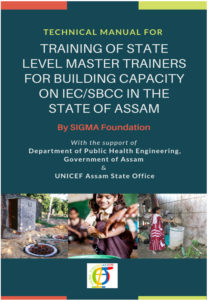A Technical Manual for “Training of State Level Master Trainers for Building Capacity on IEC/SBCC in the State of Assam”
Contributed By: Dr. M.N.Roy, Dr. Debasri Mukherjee, Er. Sohini Tarafdar, Er. Biswajit Chakraborty, Mrs. Debaleena Bhattacharya, Mr. Ganesh Choudhary, Mr. Monoj Das, Mrs. Tulika Buragohain & Mr. Dilip Kumar PalThe Government of Assam has shown an exemplary initiative in making the state ODF as envisaged in the Swachh Bharat Mission. The progress of construction of household toilets have increased substantially and more than 27.9 lakh toilets have been built in the state after launching the SBM(G) in October 2014. However, construction of toilet has been driven by provision for subsidy for construction and strong programme management along with political will from the highest end at the state as well as the centre. Compared to such huge achievement there has not be appropriate transformation of the community in terms of having necessary knowledge, developing proper attitude to sanitation and adopting behaviour for not only using toilet for defecation instead of going to the open and maintaining personal hygiene for cutting the faecal-oral route of transmission of pathogen present in human waste causing diseases. Generally, change of behaviour is a slow process and even adoption of sanitary behaviour on the face of strong campaign and monitoring may be temporary unless there is appropriate behaviour change communication to enable the people internalize the issues and demand comes from within to adopt a better life style with dignity and with less risk of falling ill.
Public Health Engineering Department, Government of Assam (PHED) took an initiative to augment the capacity of their human resources in strengthening IEC/SBCC activities. The most effective communication in this regard is believed to be Inter Personal Communication (IPC) to be carried at the village level. MDWS has issued guidelines for engagement of Swachhgrahis who will cork voluntarily but will be given incentive against their work. They will be from the villages and their services will be utilized to carry out IEC/SBCC activities intensively. This is easier said than done since the Swachhgrahis who have been engaged have not been trained yet in most places and without receiving proper training nothing much can be expected from them. Training large number of Swachhgrahis, managing them and monitoring their performance has become an urgent need for development of capacity in taking up IEC/SBCC activities at the state level.
PHED has adopted a strategy of developing state and district level Master Trainers (MTs) so that their services could be used for training the Swachhgrahis and to also have supportive supervision for proper management of the cadre. To start with the district level MTs will be developed for the districts of Dhubri, Goalpara, Tinsukia, Dhemaji, Barpeta and Majuli. UNICEF Assam state office has agreed to support the training of MTs and has assigned the task on SIGMA Foundation.
The approach to the training has been to adopt the model of community approach to sanitation with appropriate adoption to make that suitable for sustainability of ODF and focusing on association of health and nutrition with open defecation, need for proper hygiene and menstrual hygiene management and solid and liquid waste management. Since this is Training of Trainer, adequate emphasis has been given on pedagogical aspects of training and imparting skill on training methodology for effective learning outcome of the Swachhgrahis.
The 5 day’s training plan has been designed appropriately keeping in mind the knowledge and attitude to be imparted along with development of skills as trainers. The content of the sessions with appropriate elaboration has been provided in this Manual to work as a guidebook of the trainees, which will help to reinforce their learning

